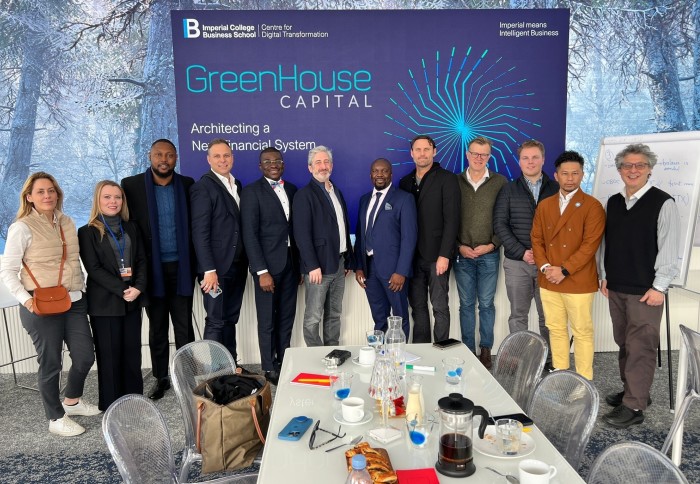Digital currency and climate innovation under the spotlight at Davos

David Shrier and Professor Chris Tucci with attendees at an event hosted by the Business School
The need for digital currency to help solve societal challenges in Africa was among the key issues discussed by Imperial experts at Davos 2023.
In a discussion hosted by the Business School’s Centre for Digital Transformation, experts from the private sector, academia and government gathered to discuss how Africa can develop digital currency alternatives to address critical issues facing the continent. They discussed the best ways to help a developing economy using digital finance, drawing not only on the participants, but also prior work by Imperial College Business School in Tanzania.
The discussion looked at the value of stablecoins – cryptocurrencies which aim to provide an alternative to the high volatility of more popular cryptocurrencies such as Bitcoin. Stablecoins are especially helpful in Africa as they can help to offset inflation and avoid the devaluation of national currencies.
"This year optimism about tackling the world’s biggest problems was back with a vengeance." David Shrier Professor of Practice AI & Innovation, Business School
The discussion also touched on the need to incorporate environmental, social and governance (ESG) and marry biodiversity within financial inclusion, how to manage the risks associated with central banks, the need to safeguard citizens and to effectively maintain monetary policy.
Driving finance for climate innovation
In a separate debate, experts addressed how the public sector could support private capital in commercialising climate innovation. Investors representing more than US$ 300 billion of capital joined in conversation with climate innovators and Imperial researchers .
They discussed the challenge of how deep tech, like climate innovation, has greater financing requirements than is typically found in software of other areas of venture capital-supported startups. They also discussed how policy interventions could help bridge this gap including public-private partnerships.
Responsible leadership and inclusive technology
Professor Francisco Veloso, Dean of Imperial College Business School, took part in a panel hosted by the Financial Times, which looked at the need for business schools to play their part in creating the next generation of socially responsible business leaders.
Watch Professor Veloso discuss how technology such as web3, blockchain and cryptocurrency needs to be more socially inclusive, with Kunmi Demuren, Founding Partner of Greenhouse Capital, a platform which connects startups, corporates and investors that are driving innovation in Africa.

Solutions to sustainable fashion
The Leonardo Centre on Business for Society, in collaboration with the Dyson School of Design Engineering, hosted a roundtable to co-design a global collaborative platform to accelerate the systemic transition toward sustainable and just mobility systems. In a separate discussion, the Leonardo Centre teamed up with PANGAIA, a company that specialises in sustainable fashion and the Royal College of Art, to discuss plans to co-design a Sustainable Fashion System Co-Lab – a global platform to accelerate transition towards a sustainable and just fashion industry.

Reflecting on this year's Davos fringe, David Shrier, Professor of Practice, AI & Innovation at Imperial College Business School, one of the organisers of the Imperial events said: “This year optimism about tackling the world’s biggest problems was back with a vengeance. In contrast to the more intimate May experiment of 2022, this year was much more like the pre-Covid era with a buzz of energy everywhere you went. Our pavilion served as a useful attractor, not only for those wishing to partner with the Business School, but also alumni who identified themselves and then ended up being able to participate in our events.”
Article text (excluding photos or graphics) © Imperial College London.
Photos and graphics subject to third party copyright used with permission or © Imperial College London.
Reporter
Laura Singleton
Communications Division